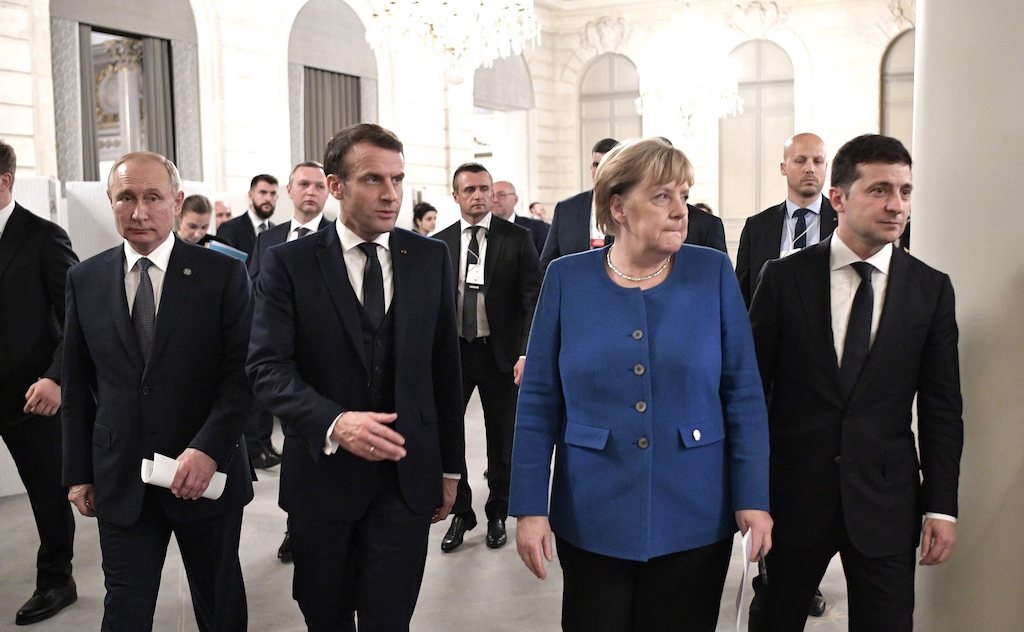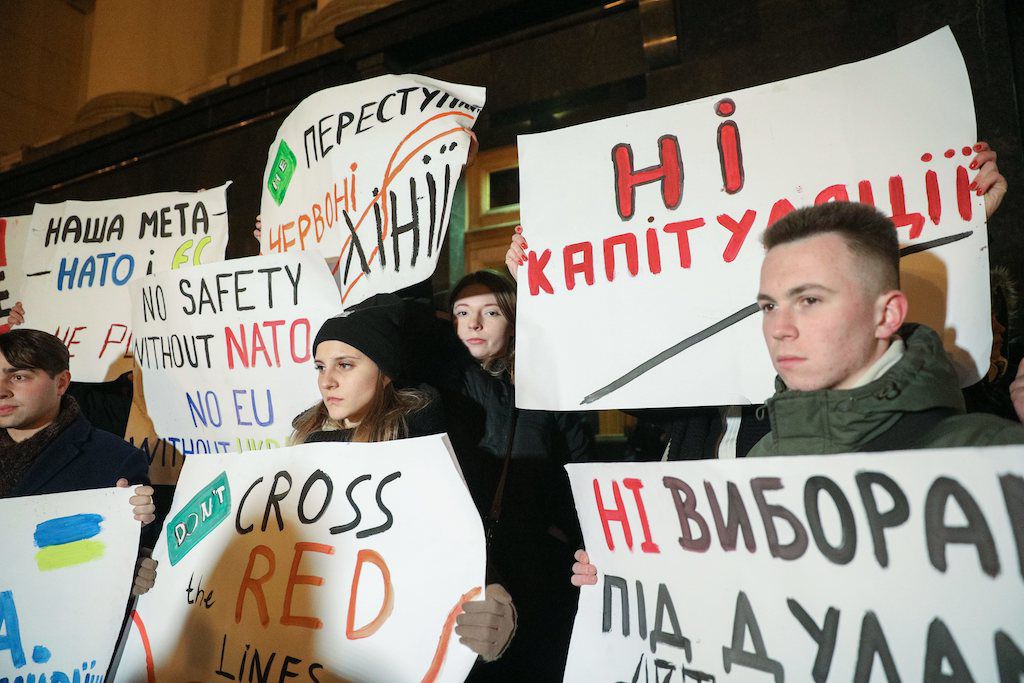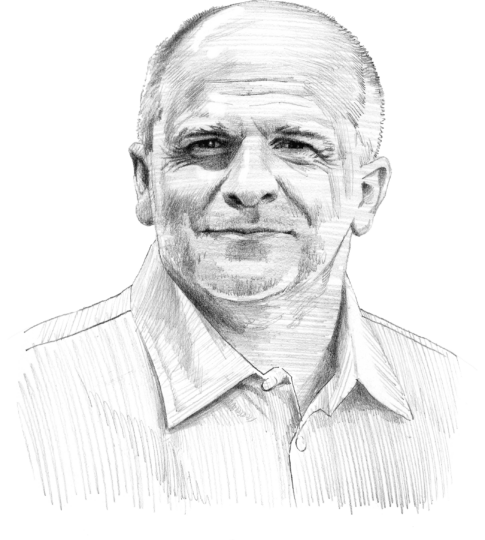Russia and Ukraine, or who will outwait whom?
The leader of Ukraine had high hopes for the Normandy Four talks. President Vladimir Putin does not hurry to end the conflict. The U.S. has lost interest in Ukraine, while Germany and France are pursuing a complex agenda.

In a nutshell
- Ukraine is no longer at the center of U.S. political attention
- The new leader in Kiev seeks to end the Donbas conflict
- He counts on France and Germany’s help in talks with Russia
Ukraine has been in the news lately. The attempt to impeach the sitting president, currently the hottest political development in the United States, is related to Ukraine. U.S. citizens hear of Ukraine practically every day. At the same time, having business interests and contacts in that sizable European country has become a kiss of death in American political circles.
It is worth remembering that the beginning of Donald Trump’s presidency positively surprised many observers in Central Europe. The new administration took issues of defense and energy in Central Europe and Ukraine seriously. U.S. engagement in Ukraine, especially, appeared to be a consistent policy choice aligned with the views of President Trump’s closest advisors.
The Biden debacle
This intensified U.S. involvement in Ukraine annoyed Moscow. However, after the Hunter Biden affair erupted in Washington, the attitude of the Trump administration toward Ukraine underwent a radical change. When it was leaked – by Americans, not Ukrainians – that President Trump had leaned on Kiev to restart the prosecution of a businessman who happened to be the son of the front-runner in the race for the Democratic presidential nomination, Ukraine’s stock in the U.S. dropped like a stone.
President Macron has opted to revert to the old Gaullist tradition and communicate with Moscow on his own.
Mr. Trump’s request proved impossible to grant. The Ukrainians realized that obliging him would ruin their relations with the U.S. Democratic establishment for years to come. The affair also led experts on Eastern Europe, including U.S. Special Representative for Ukraine Negotiations Kurt Volker, to leave the administration. In the aftermath of the disaster, the president appeared to conclude that Ukraine is a European matter best handled by European countries alone.
This opened the playing field wide for French President Emmanuel Macron. For him, Ukraine is merely one element in a broader political game. In his worldview, the European Union is weakening and will not have a uniform policy toward Russia; NATO is even weaker because of self-centered policies in certain member states like Turkey and Hungary; and the U.S. president chooses to deal with individual forces in the world on a bilateral basis rather than through alliances.
Emmanuel and Volodymyr
Given all that, Mr. Macron has opted to revert to the old tradition of President Charles de Gaulle (1959-1969) and communicate with Moscow on his own. For this approach to work, however, Paris needs to find a way to settle, at least superficially and temporarily, the problems related to Ukraine. An impression that the West has “sold Ukraine” must be avoided at all costs. As a result, Ukraine has become a key to France’s neo-Gaullist dream.
Focused and foreseeing as he can be, President Macron established a rapport with Volodymyr Zelenskiy early, during the presidential race in Ukraine. One week before the election campaign ended, the French leader received the Ukrainian candidate at the Elysee Palace.
In theory, the two have overlapping interests: President Zelenskiy needs to calm down, or preferably end, the conflict; he has promised no less to his voters. However, this has to be achieved with Western guarantees and by no means under “pressure” from Moscow. Mr. Zelenskiy played this intricate hand with some finesse: he held direct talks with Russian President Vladimir Putin from time to time, but the main venue for deescalating the conflict was supposed to involve the Western partners, primarily the president of France. Meanwhile, President Macron needed relations with Moscow to improve, but only under the condition that no one accused Paris of betraying Ukraine.
Thorny annexation
Theoretically, Ukraine can count on support from Germany. However, Chancellor Angela Merkel is already a lame duck and her anointed successor, Annegret Kramp-Karrenbauer, is not necessarily going to toe Ms. Merkel’s line on Ukraine. There is some hypocrisy in the West’s position toward Moscow these days: the sanctions imposed on Russia after the annexation of Crimea more than five years ago remain in force and harsh criticism of Russia’s attitude is a permanent fixture of political speeches. In parallel, however, many Western leaders are calling for a reset in relations.
The Kremlin also sees its room for maneuver widening due to the West’s internal problems.
Some problems persist. Formally, no one in Europe is ready to recognize the new borders drawn by force during Russia’s annexation of Crimea – least of all, the countries of the former Soviet bloc, such as Poland. In practice, a reset in relations with Russia could take place anyway, and the thorny annexation issue could become a frozen conflict.
The Kremlin also sees its room for maneuver widening due to the West’s internal problems and the decreasing political cohesion of NATO. More than five years after the Maidan revolution in Kiev and Russia’s stealthy intervention in Donbas, Mr. Putin finds himself in a comfortable position. It is the result of the West’s weakness, not Russia’s strength.
Zelenskiy’s dilemmas
Now that Washington has limited its activity in the Ukrainian arena, President Zelenskiy’s peace project has become even more challenging. The latest chapter of the saga took place on December 9 in Paris, at a meeting between the leaders of France, Germany, Russia and Ukraine, the four “Normandy Format” peacemakers. Key policy goals of the Ukrainian president remained unchanged since his election campaign, but his popularity at home had begun to sag. In tactical terms, Mr. Zelenskiy needed to be perceived as the face of peace, in contrast to his predecessor Petro Poroshenko (2014-2019), whom Ukrainians associate with war. On matters of substance, however, the Ukrainian leader could not count on any real, active support from the Western participants.
Mr. Zelenskiy is already subject to fierce criticism at home for his alleged readiness to sell off Ukrainian interests. His opponents do not have a majority in the Verkhovna Rada, the country’s parliament, and opinion polls do not give them a majority on the peace issue. However, they represent a significant part of the minority of Ukrainians interested in politics. Over time, their arguments may prove persuasive to the general public. It was an ominous sign that, when Mr. Zelenskiy was conducting his talks with Europe’s heavyweights in Paris, his critics at home managed to arrange noisy street protests against it.

An interesting aspect of the peace process is the so-called Steinmeier Formula. The brainchild of Frank-Walter Steinmeier at the time when he was Germany’s foreign minister from 2013 to 2017, it is essentially a call for a federalization of Ukraine modeled after the German system. The West has been waiting for Ukraine to embark on this path as a way to resolve the Donbas crisis. From Kiev’s point of view, this is the most difficult topic.
It is evident to Ukrainian leaders that such a solution would render Ukraine strategically paralyzed for decades. If all strategic decisions of the Ukrainian state were to be made with the consent of the independent authorities in Donetsk, no major policy shifts, including accession to the EU or NATO, would ever take place. The Russian influence in a “federated” Donbas would make them impossible.
Officially, no one is pushing Ukraine to adopt the federal model under the guise of the Steinmeier Formula. Still, Kiev has been under informal pressure to move in this direction.
The Kremlin’s perspective
Moscow aims to stop the Western vector of Ukrainian policies and continue to exert control in domestic Ukrainian matters. The Kremlin urgently wants to remove the sanctions and diplomatic stigma that have restricted Russia since the Crimea crisis. It seeks to bring the annexation case into political hibernation and, through legal tricks, allow Western companies to invest in Crimea.
President Zelenskiy realized in Paris that President Putin was not ready to budge on the key issues.
As for Donbas, Moscow is not prepared to step back because any move in this direction would strengthen Ukraine’s position in the region. Russia has been systematically eliminating Ukrainian institutions, for example banks, from the area controlled by the secessionists. It continues to provide military assistance to the separatist faction and helps the two secessionist “peoples’ republics” there to create administration independent of Ukraine. The Novorossiya project, i.e., extracting further territories from Ukraine to the Black Sea, is dormant now, but this could change in the event of further destabilization in the Dnieper river basin.
Paris in December
The Paris Normandy Format meeting was not, in itself, a significant event. However, it could be seen as a litmus test of current Ukrainian-Russian relations and forecast possible changes in the political climate in Central Europe and, above all, in Russia’s relations with the West. From this angle, the results are clear.
President Zelenskiy realized that President Putin is not budging on the key issues. Before Paris, the Ukrainian leader was keen on letting his Western interlocutors know that he “had a way” for handling the Russian president. In the end, Mr. Zelenskiy had to content himself with a cease-fire and the exchange of all prisoners of war.
Mr. Putin most probably returned home from the summit in a better mood. Pictures from his ceremonial welcome in the French capital circulated around the world, highlighting the recovery of his international status from the lows of 2014. These days, the president of Russia presents himself as a co-architect of peace, not a warmonger. He even managed to include some wording appearing to relate to the Steinmeier Formula in the meeting’s final statement.
At the meeting’s end, President Zelenskiy found himself so frustrated that he made a tactical mistake: he blurted out that he had had higher expectations and would need to put on a brave face back home.
Scenarios
How events in Ukraine develop further will largely depend on the West’s policy toward Russia, especially as it relates to Donbas. Given Donald Trump’s character, Ukraine may find it difficult to make it back to the top of Washington’s political agenda if the president is reelected.
Also, falling domestic support represents a challenge for President Zelenskiy. The opposition’s charges are likely to get more traction, especially recriminations that the transition from former President Petro Poroshenko’s robust defense of the nation’s interests to Mr. Zelenskiy’s submission to the West works only in Russia’s interest. In turn, Russia is unlikely to miss such an opportunity to further destabilize Ukraine.
Ukrainian-Russian relations are usually analyzed from the perspective of changes in Ukraine, but developments in Russia can also trigger shifts. According to all possible forecasts, if Mr. Putin is removed from power by someone from his surroundings (the most likely variant of political change in Russia), this will lead to a radicalization of Russian policy, at least initially. Such a turn of events could add fuel to the conflict in Donbas. In this scenario, the loosely knit, understated design of the Normandy process will provide little cover and Western leaders could find themselves under intense pressure to support Ukraine.
It is also possible that President Zelenskiy and his entourage will conclude that it makes no sense to grant concessions to Russia under the patronage of the West when the latter is at a moment of historical weakness, and thus return to the political route set by their predecessor. Such a policy change would need to be carried out subtly. A harder stance toward Russia would not bring Mr. Zelenskiy international popularity. This could prove costly for Ukraine, as many of the West’s obligations to Ukraine made during the Poroshenko era were never put on paper. President Zelenskiy could find it difficult to force unwilling partners to make good on their promises.
However, the Ukrainian leader may adopt a wait-and-see attitude, trying to block further communication between the West and Russia at the expense of Ukraine and, as a result, curb the worst of the criticism at home. Perhaps this is the only realistic path for Ukraine right now, regardless of who is at the helm. There are no indications that full-fledged elections in Donbas or restoration of Ukrainian control of the border with Russia will take place in the foreseeable future.
This strategy would be rooted in the assumption that, eventually, events in the West or Russia will open up new opportunities for Ukraine. The most likely scenario at this point is that Mr. Zelenskiy will wait.








